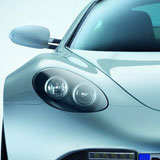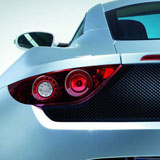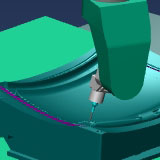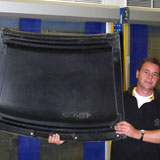



Vero and DECS GmbH help Artega GT
DECS GmbH, based in Thuringia, Germany are specialists in the design and manufacture of interior & exterior trim composite components for the automotive industry. Reference customers include Audi, BMW, Lamborghini, Mercedes, and Porsche.
Originally founded in 1994, DECS GmbH are an innovative, forward looking company who embrace technology and firmly believe in process optimisation. It is a combination of all these factors that have helped their latest project, the Artega GT succeed, and cause quite a stir in the automotive world.
"We looked extensively at the CADCAM market and decided on VISI, not only because the solution impressed us the most, but also because of the price to quality ratio of the system.”
Ulrich Krämer
The Artega GT is an amazing mid-engined, rear wheel drive, high-performance sports car designed by Henrik Fisker, the man responsible for the much celebrated Aston Martin Vantage and the sweeping lines of the BMW Z8. The two seater GT has an aluminium space frame and carbon fibre reinforced body. Providing the power is a Volkswagen-sourced 3.6L V6 engine reaching 60mph in under 5 seconds.
Within the framework of this project, DECS GmbH have contributed significantly with the manufacture of the front bonnet, tailgate, as well as the roof. Ulrich Krämer, Managing Director of DECS GmbH explains how the project started. "Artega originally contacted us because we have been involved in a number of projects with other prestige automotive clients and possess the skill and knowledge required for the development of composite components. For the initial pilot project, we first created five parts using a prototype tool. This must have left a good impression with Artega as we were then invited to participate in the second phase in which we produced a pre-series set of tooling for the front bonnet and tailgate for testing. After successful pre-series testing, we now manufacture the complete suite of production parts for the front bonnet, tailgate and roof."
One example of technology innovation is the special expertise DECS GmbH have developed in the production of polyurethane-based composite components using a honeycomb core. This is especially relevant in the development of automotive interiors as the potential weight reduction is extremely attractive to car manufacturers. Natural fibre-reinforced polyurethanes are being used more and more in the automotive industry and it is now possible to produce parts with wall thicknesses of 1.5 – 2.0 mm - depending on the unit weight of the natural fibre mat used. These end products weigh about 45 % less than products created using conventional injection moulding materials.
One example of process optimisation is the use of Huber & Grimme gantry milling machines, which are equipped with efficient two shaft spindles and tandem work-tables for multi-axis part trimming. Once the body panels are removed from the tool, they are placed onto jigs and fixtures for part trimming and additional CAM operations. All 5-Axis operations are programmed using VISI Machining from Vero Software and posted using a Siemens 840D controller. Due to the complex nature of multi-axis machining, NC programmes are also simulated prior to running on the shopfloor. The simulation checks against the physical machine limits and ensures process-safe toolpaths.
The relevant jigs and fixtures are also designed using VISI and produced at DECS. "VISI is the ideal tool for the construction of the trimming jigs", explains Ulrich Krämer. "One major advantage is the ability to constantly switch between solid and surface technologies. This is vitally important to us and allows us to follow a flexible design path. VISI provides interfaces to all the significant data formats such as CATIA, UG, Pro E, STEP, IGES and SAT and this allows us to handle our clients native CAD data with confidence."
VISI has been in use at DECS GmbH since 2005 when the software was provided as a solution for simultaneous 5-axis milling to solve a problem that involved the complicated trimming of plastic parts with undercut positions that could not be could be processed with water-jets.
Ulrich Krämer concludes, "We looked extensively at the CADCAM market and decided on VISI, not only because the solution impressed us the most, but also because of the price to quality ratio of the system. VISI caters for all our needs and has in fact exceeded our expectations. We stepped in at version 12 and from there to the current version has been a gigantic leap forward. VISI is continually under development and we are often asked what we would like in the software. We know that the software will be around in the future which means security in planning. Vero have provided a powerful, yet cost effective solution for the design and manufacture of complex tooling."
About The Company:
Name: DECS GmbH
Benefits Achieved:
- Integrated solid & surface technologies for data manipulation
- Single product interface for design and manufacture
- Accurate and reliable multi-axis toolpath trimming
"We looked extensively at the CADCAM market and decided on VISI, not only because the solution impressed us the most, but also because of the price to quality ratio of the system.”
Ulrich Krämer







